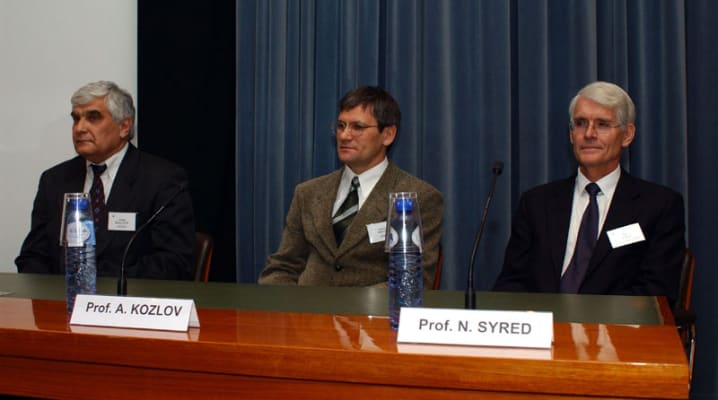The first NATO Science Partnership prize has been awarded to a trio of scientists from Russia, Ukraine and the United Kingdom for their collaboration on innovative cooling techniques for gas-turbine engines.
The award was formally presented to Artem Khalatov of the Institute of Engineering Thermophysics, Ukrainian Academy of Sciences, Aleksandr P. Kozlov of the Kazan Science Centre of the Russian Academy of Sciences, and Nick Syred of Cardiff University at an October ceremony at NATO headquarters by NATO Secretary General Lord Robertson. It included a trophy, certificate and research grant of 10,000 Euro for each scientist.
The design of gas-turbine engines and the development of new techniques for improving efficiency had been the focus of research in both Western countries and the former Soviet Union for many years. It was not, however, until the end of the Cold War that scientists from East and West were able to pool expertise and the combined potential of both communities could be realised.
The NATO grant was awarded in 1998, and helped the three scientists work together over the next two years. The results of their research, namely enhanced cooling techniques, could be applied to the next generation of jet engines, to allow more efficient operating temperatures. This should translate directly into fuel savings, longer ranges, higher performance, lower costs and improved logistics for both civilian and military aircraft.
In an acceptance speech, Professor Khalatov contrasted the world today with that of the Cold War, saying: "It is extremely important that NATO and Partner countries are now working together for peace and world stability. Such scientific collaboration is much better than any competition in military areas and can bring substantial benefits to all parties involved."
The NATO Science Partnership prize was created to recognise excellence in collaboration between scientists in NATO member states and in countries belonging to either the Euro-Atlantic Partnership Council or the Mediterranean Dialogue. Established under the NATO Science Programme, the annual prize would normally be awarded jointly to two scientists - one from a NATO country and one from a Partner or Mediterranean Dialogue country who have collaborated as a result of a grant awarded through the Programme.
In selecting three winners for the first prize instead of two, the NATO Science Committee Selection Board recognised the essential three-way collaboration between the researchers who each brought unique expertise and research knowledge to the project.
The NATO Science Programme was created in 1958 on the basis of the recommendations of a Committee on Non-Military Cooperation in NATO. The report of the so-called "Three Wise Men" asserted that progress in the fields of science and technology could be decisive in determining the security of nations and their positions in world affairs, and stated that science and technology was an area of special importance to the Atlantic community.
Since the early 1990s, the NATO Science Programme has served a wider scientific community, as researchers from countries belonging to the Euro-Atlantic Partnership Council and Mediterranean Dialogue became eligible for support. And it was transformed in 1999 so that support is now focused on collaboration between Partner-country and NATO-country scientists and supporting research in Partner countries.
The NATO Science Programme does not fund research as such, but rather provides the funding for researchers to collaborate, primarily through travel and subsistence support. In this way, NATO financial support can be a catalyst for generating long-term research cooperation and close working relationships among scientists from NATO and Partner countries. About 10,000 scientists currently participate in NATO Science activities each year.
*For more information on the NATO Science Programme, see http://www.nato.int/science/index.html

